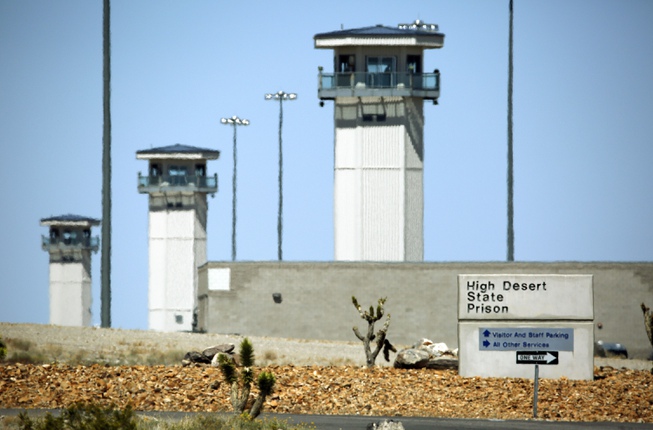
John Locher / AP, file
Guard towers loom over the High Desert State Prison in Indian Springs, one of seven state-operated correctional facilities in Nevada. A prisoner advocacy group is raising concerns about the quality and amount of food given to inmates in the state prison system.
Thursday, June 27, 2024 | 2 a.m.
Some family members of inmates in Nevada’s seven state prisons say they worry that the state is falling short on its duty to provide nutritional meals — and in adequate portions.
The issue has been simmering for some time, according to Return Strong, the largest prisoner advocacy group in the state.
But it has come under increasing concern since October, when the Department of Corrections and its food-service vendor, Aramark, reworked the menu for most prisoners to cut food costs.
The department had misinterpreted a state mandate requiring more expensive, low-sodium options to be available for inmates with certain health conditions, said Kristina Shea, the deputy director of the Department of Corrections told the Interim Finance Committee of the Nevada Legislature at a meeting this month. She said the confusion led to Nevada prisons providing the more expensive food to all inmates, which caused an increase in costs. The menu was updated to correct the issue, Shea said.
The more expensive foods forced the Department of Corrections to request $2.2 million from the Interim Finance Committee to fill a funding shortfall through the end of the state’s fiscal year, which is June 30.
Lawmakers denied the request but said they would take it up again in July after receiving additional information about the funding gap.
Legislators on the finance committee joked during the committee meeting about “expensive palette(s)” before denying the request.
“Obviously we’re making light of it, but it’s a real issue, you’re asking for $2.2 million that would otherwise go to the general fund,” Assembly Speaker Steve Yeager, D-Las Vegas, said during the meeting.
But families of those incarcerated are less amused by the shortfall and are worried the funding shortfall could exacerbate preexisting issues with the food in Nevada prisons.
“I don’t think there’s a parent of an incarcerated person that is demanding steak for their loved ones,” said Nancy Farrey, a Return Strong member whose son is in Lovelock Correctional Center. “We’re not asking for steak, we’re just asking for nutritional food with an adequate proportion.”
Farrey and fellow Return Strong member Yvonne Efverlund are part of the group’s “Food Fight,” which focuses on advocacy and awareness for basic nutrition of the incarcerated. They said some of the inmates who work with the organization have expressed severe concerns about health issues and malnutrition, which Farrey said becomes another obstacle to overcome when inmates are released.
“If 95% of inmates are going to be released, which let’s all pray for that, then they’re going to take their health issues right into society, and they’re going to have to be taken care of,” said Farrey “And so somebody is going to end up paying for all of the medical care.”
Department of Corrections guidelines call for prisoners to receive three meals daily — two warm and one cold. The meals, which are sourced through Aramark, must consist of basic nutritional requirements outlined by the National Academy of Sciences.
For instance, dinner could be a breaded chicken patty with bread, or a pasta with three to four meatballs.
A report from the Department of Health and Human Services in January found no major violations for the Nevada prison menus’ nutritional adequacy. Health officials for the report conducted interviews and surveys at several of the Nevada prisons, but advocates say they are still skeptical.
“In all the research that I’ve done and then going to the meeting with Aramark the other day, there’s a real confusion I think with the chain of command within the kitchens,” Farrey said. She said the meeting left her wondering about who, ultimately, was accountable for food quality.
Lawmakers on the Interim Finance Committee indicated they would take up the issue again at their July 16 meeting, and they’ve asked the Department of Corrections to provide more detail on changes to the prison system’s food services and menu.
“I think we need more detail of exactly what those menus were before and the costs of those, (then) moving forward what the menus are going to be, and if this $2.2 million would be the dollar amount needed for these changes,” Assemblywoman Daniele Monroe-Moreno, D-North Las Vegas, said.
Aramark met last week with prison officials to discuss solutions to the shortfall, a spokesperson with Return Strong said. Department of Corrections officials would not respond to requests for comment, only saying there has been no disruption in the frequency of prisoners being fed.
“The Nevada Department of Corrections will continue to feed offenders in its care as regularly scheduled,” the department said in a statement. “There will be no interruption in service. Providing for the necessities of the offenders within a safe and secure environment is the top priority of the Department.”
More than 10,000 people are incarcerated in department facilities. Each inmate is projected to cost the state about $24,500 annually, according to the governor’s 2023-2025 executive budget.
[email protected] / 702-990-8926 / @a_y_denrunnels
